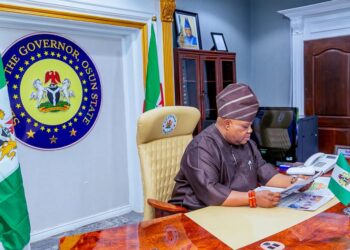Following his participation in the just concluded Munich Security Conference, Governor of Taraba State, Agbu Kefas, in this interview, addressed critical issues facing Nigeria and his state, ranging from economic strategies and food security to climate change and security challenges. Kefas emphasized the importance of international collaboration and strategic partnerships to drive development and address pressing global issues. He spoke with Juliana Taiwo-Obalonye
Considering recent economic forecasts, what strategies should Nigeria adopt to strengthen its role and influence in the global economy?
In today’s interconnected world, no country can succeed in isolation without collaboration and partnership between nations. This conference (Munich Security Conference) provides a platform to strengthen those bonds and explore new opportunities for mutual growth. Nigeria, as one of Africa’s largest economies, is rich with potential, and the government is actively implementing policies designed to attract foreign investment. By deepening our understanding of global economic trends and fostering stronger international cooperation, we can craft policies that not only align with global standards but also drive sustainable economic growth for all involved.
What specific agricultural initiatives is Taraba implementing to boost food security, and how do they contribute to Nigeria’s national food security goals?
You would agree with me that there is a global need for food security, and in Nigeria, Taraba State, located in the north-eastern part of the country, is blessed with arable land and holds a great opportunity for ensuring food security. My agricultural policy is simple: to improve our yields by mechanizing agriculture in Taraba State. We also plan to embark on irrigation projects to enable farming activities all year round.
In addition, we are working on training our farmers and integrating them into a system where they can actively and effectively participate in agriculture. With these efforts, along with collaborations with other agricultural investors, I believe we will be able to meet the demands for food security nationwide.
What steps is your administration taking to tackle climate change impacts in Taraba State, and how do these efforts align with national and global initiatives to support the poor and vulnerable?
Well, in my first year of administration, I participated in COP 28, and Taraba State is one of the states included in that climate change initiative. So far, in my first year, I allocated five per cent of the state’s budget to greening Taraba and ensuring we adapt to the climate change situation that has come to stay with us. We are making efforts to plant trees to address deforestation and promote reforestation, which will help us meet sustainability requirements and improve life for our people.
However, there is still more work to be done because there is some resistance; many people are not fully aware of the issues surrounding climate change. But gradually, through enlightenment campaigns and other initiatives, we are involving all citizens in this effort, and I believe we will get it done as it should be.
What strategies do you, as a retired military officer, recommend for addressing escalating security challenges in Taraba State, and what specific security issues have you identified as most pressing, along with your proposed action plan for effectively tackling them?
Currently, Taraba State has a stable security situation due to the multi-faceted approach implemented upon my assumption of office. This involved engaging federal troops, community leaders, traditional rulers, and citizens, emphasising that security is a collective responsibility. As governor, ensuring the safety of our citizens is my priority, and we are achieving this through collaborative efforts and strategic initiatives that have significantly reduced kidnapping and threats from illegal mining. Mining activities were suspended to align with the federal government’s vision for responsible mining that does not cause insecurity and destruction. This effort is ongoing, and we are taking the right steps.
Recognising that poverty fuels insecurity, we are leveraging our agricultural potential to ensure food security by encouraging every citizen to engage in farming. Furthermore, to address the issue of out-of-school children being vulnerable to criminal exploitation, we have declared free education for primary and secondary schools, resulting in a significant increase in school enrolment. Our focus now is on improving school infrastructure to accommodate these students.
With continued support, partnerships, and collaborations with the international community, we are confident in making Taraba State a better place. I believe my fellow governors are also dedicated to enhancing security in their respective states.
What obstacles confront nations in the Global South, and how can Nigeria leverage its involvement in regional organisations to help resolve these challenges?
While this matter is primarily addressed at the national level, and I operate as governor at the sub-national level, I am aware that the President of my country is committed to fostering regional cooperation on security, development, and progress through platforms like ECOWAS and the African Union. This is an ongoing process, and forums such as this conference, along with other meetings, will undoubtedly broaden our understanding of the challenges facing various countries. This understanding will then inform how we can best assist one another in achieving forward progress.
What infrastructure projects are you prioritizing in Taraba State, and how do they support your vision for economically and politically repositioning the state to take a leading role in Nigeria’s national development agenda?
Yes, the initial step involved identifying the state’s potential, leading to the creation of a developmental master plan that is currently active. Subsequently, the focus shifts to road connectivity, given that the state shares borders with five other Nigerian states and Cameroon. The aim is to facilitate the unrestricted flow of economic activities by collaborating with the federal government to reconstruct roads that have been disrupted. Simultaneously, efforts are underway to reopen the airport in the state capital, Jalingo, to facilitate access for investors and business professionals. Furthermore, there’s an ongoing initiative to establish road connections between communities, streamlining the transportation of agricultural goods.
Infrastructure is paramount, receiving high priority and collaborative efforts with interested investors. These discussions are anticipated to soon yield substantial developmental progress within the state.
What initiatives is your administration implementing to enhance healthcare access in Taraba State in light of the ongoing global health challenges?
Well, right now, we’ve been able to identify all the Primary Healthcare centres across the 16 local government areas, covering the 168 wards. We have renovations and equipping of health facilities ongoing, and I’ve also worked to procure ambulances – mini tricycle ambulances – for all 168 healthcare centres. Additionally, I’m improving and equipping our existing hospitals. I’ve also procured a mobile hospital, so we can move it from place to place to intervene in case of any outbreak. My focus is also very much on health, because it’s really important, and I think we’re making progress. I believe that with further interventions from other sources, we’ll be able to meet the demand.
One of the challenges is lack of healthcare workers and doctors, and we’re working on employing more and also training the ones we already have. Looking at the health sector, we have a College of Nursing and Midwifery that had been quite dormant. Many of the projects were incomplete. But we’re currently working on that to ensure we make it competitive and conducive for training and developing healthcare workers, nurses, and midwives.
What strategies is your administration employing to attract investments to Taraba State in key sectors like renewable energy, mining, and industrialization, while also improving the ease of doing business, which is critical for economic growth and sustainability?
It might interest you to know that I just returned from Indian Energy Week, where I held numerous meetings, and I believe we’re making progress on that front. It’s directly from there that I came here. I’m making significant efforts to attract investors by ensuring activity within the state. On the issue of insecurity, as I mentioned earlier, I’ve addressed those concerns. Furthermore, I’m creating incentives for businesses, such as tax breaks and land leases, to make it more conducive and easier for them to invest. These efforts are ongoing, and as we engage with potential investors, we’re adapting our approach to align with their interests, ensuring mutually beneficial collaborations. So, I believe we’re making strides in that direction.
How is your administration collaborating with the youth of Taraba State to promote innovation and entrepreneurship, particularly in sectors such as agricultural technology, to harness their potential and energy?
Currently, the majority of my commissioners are young people, and we have been actively working with the youth by providing training to prepare them for taking on responsibilities, particularly in agriculture, where we encourage the use of modern technologies for farming. Additionally, we allow the youth to share their ideas on how they believe the government can engage with them. Rather than imposing solutions, we ask them what they want to do. They share their aspirations, and we strive to create an enabling environment for them to explore their potentials, gifts, and talents. This approach helps them develop a sense of belonging and empowers them to earn a living for themselves.
How will you engage with international organisations at the Munich Security Conference to tackle local and global challenges?
We are already in discussion. I have been holding a series of meetings with various interest groups, and I believe we are making progress. After the Munich Security Conference, my team and I will sit down to explore how we can incorporate the outcomes of the conference into our upcoming economic summit in the state, scheduled for May 2025. So, I see this as a work in progress.




 1 day ago
39
1 day ago
39








 English (US) ·
English (US) ·